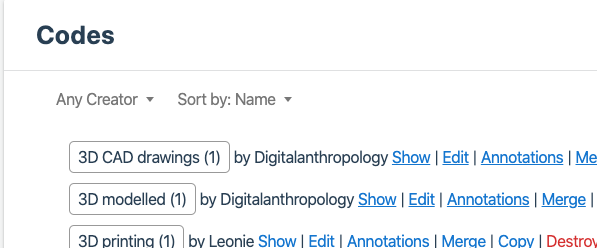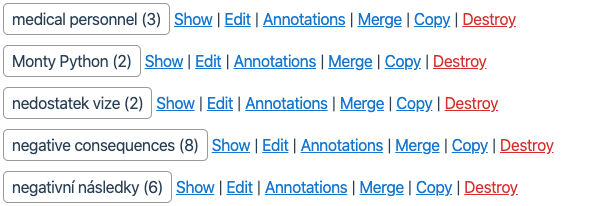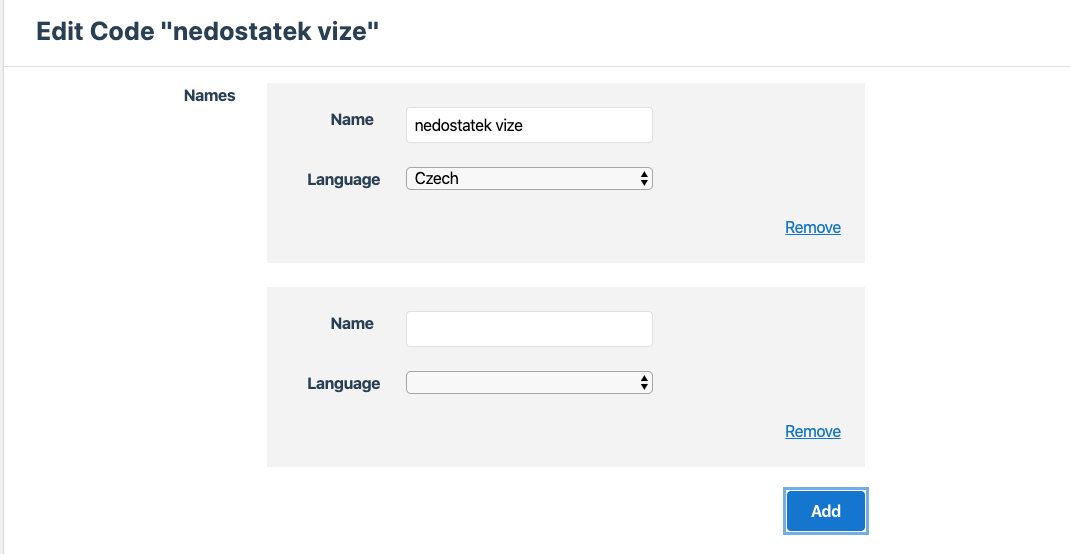Fabulous coding meeting today! Notes and action items:
@alberto and @matthias, we are on track for a July 1st visualisation. We will code (Czech forum will do a sprint) and refine/merge our codes for that deadline, at which point we will shift to analysis mode for 2 weeks and produce a writeup for July 15th.
Using the SSNA to guide us, we will then create coding categories/hierarchies in the backend using all of the POPREBEL codes (across languages) in English form.
To do this, we’d like to request a few things:
-
Matthias, am I right that you mentioned that we can now set a default view of the codebook to our own codes instead of all codes? If so, can you point us to how we can do this? The extra click is proving very time-consuming.

-
We also need a way to view the POPREBEL codes all together in the backend, so we can create hierarchies (parent/child relations) among all the codes. Is this possible (even just as a “group of creators” grouping, which includes @Jirka_Kocian, @SZdenek, @amelia, @Jan, @Wojt, and eventually @Richard)?
-
@Jirka_Kocian and @SZdenek would like to be able to see each others’ codes together in the backend and have them suggested to each other while coding. Can we group these two together (and/or instead have all codes in that language (Czech) grouped together/suggested?)
Action Items for Coding Team (important also for @Jan and @Wojt and @Richard ) :
- It looks like the codes do in fact display in English if they have an English translation attached to them, so make sure that you assign the English translation to all codes in the backend. @SZdenek and @Jirka_Kocian, it’s easy to see which ones don’t have a translation attached, because they appear in Czech and not English when you open your coding page (like nedostatek vize below).

If you open the code and click “Add”, you can add the translation under “Name” and select “English” from the dropdown.

-
In our own codebooks, we will create a tab in which we organise the codes roughly by categories (that we decide upon), making them easier to search by other team members. Do this as regularly as possible so the codebooks are more easily navigated.
-
Wait to assign hierarchies / parent-child relations in the backend until we do this together as a batch after the SSNA visualisation, since our hierarchical relationships now affect each other. Do this as much as you want in your own codebook— this is encouraged (see point 2)
-
Do cleaning work as you code, specifically making sure to merge any codes that are the same across language fora (with permission of the original creator, unless the exact overlap is very self-evident).
-
We are tracing an emergence of codes that are somewhere in between invivo codes and strictly descriptive codes. These are conceptual categories used by informants that differ from the way the same categories are used in the political science literature. For example, @Jirka_Kocian is finding that his informants are using the category ‘communism’ in specific ways, but ways that differ from the definition as used by political scientists. So we have decided upon the following naming framework:
- Codes that are invivo should be in double quotes: “witch” or “the East”
- Codes that are in between (conceptual categories used by informants), like the above, are in single quotes: ‘communism’ or ‘patriotism’
- Codes that are descriptive codes carry no quotation marks
This framework will help us understand meaningful differences between informant conceptual categories (in and across language fora) and academic literature conceptual categories – and hopefully will let us start an analytical conversation with other partners, particularly the glossary deliverable. We will edit existing codes to fit this framework and move forward using it.
Happy coding, all, and excited to see what the visualisation brings on the 1st!